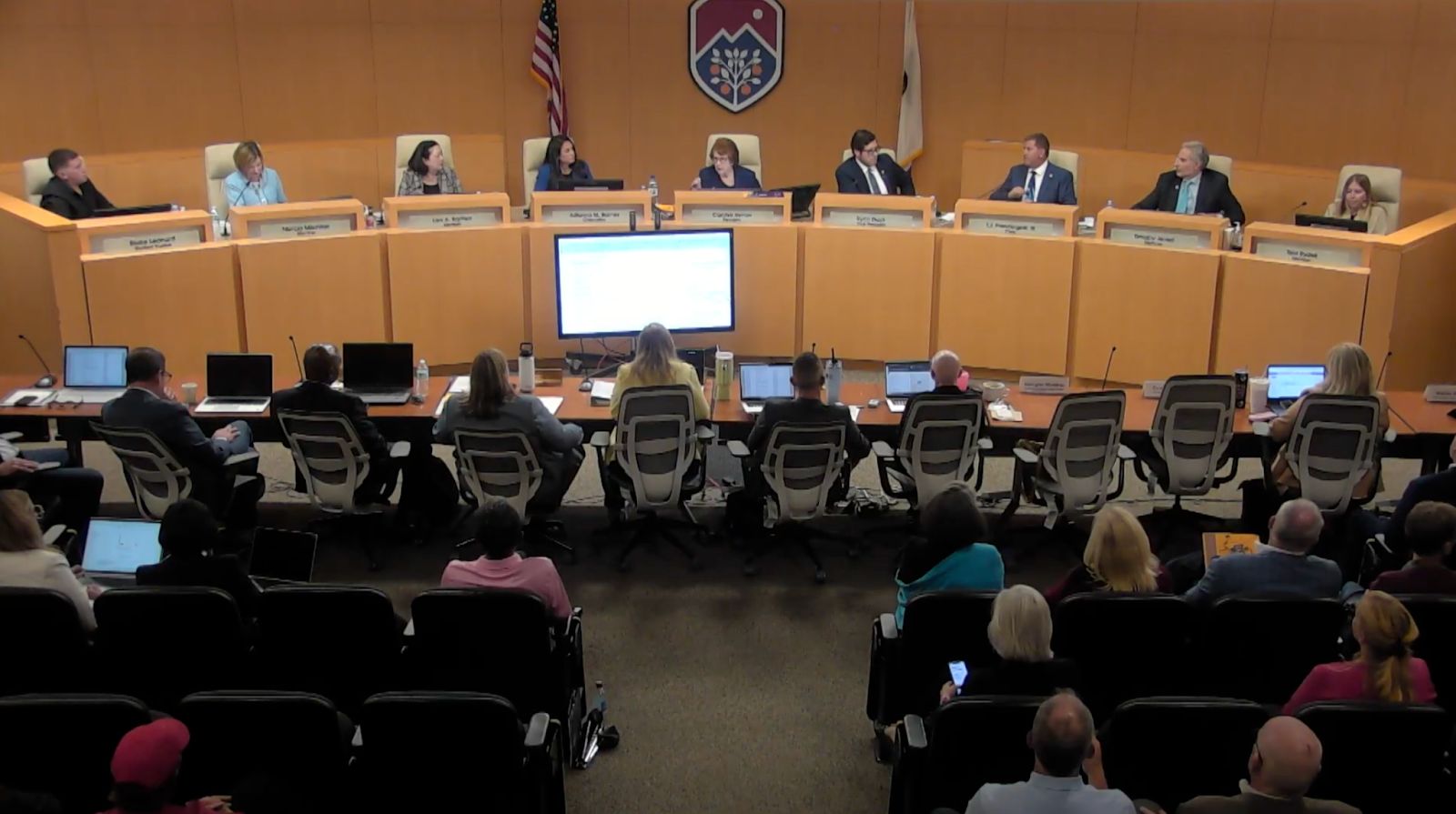Opposition against a proposed battery storage facility from South Orange County residents and elected officials has grown so fierce that local community college board members decided to nix an agreement that would have provided nearly $1 million to support students.
School board members approved the $750,000 grant agreement earlier this year, but now claim they didn’t realize the agreement was tied to a state application for a battery storage facility.
It’s part of a long-standing battle between south county residents and a project applicant who has proposed a battery storage facility that could get built on the northern edge of San Juan Capistrano near the 5 Freeway and the city’s border with Laguna Niguel.
Many elected officials — at the city, county and state levels — have joined the conversation, voicing safety concerns about the project that’s expected to feature lithium-iron-phosphate batteries connected to the energy grid that can store excess power and release that energy back into the grid when necessary.
The San Juan Capistrano City Council has already voted multiple times to prohibit the construction of new commercial energy storage systems in town after the applicant previously submitted requests at the city level.
After the city rejected the project, the applicant turned to the state instead, filing an application through the California Energy Commission (CEC), which has the power to bypass the city’s previous rulings and approve the project — as allowed under Assembly Bill 205.
Critics have voiced concerns about fire risk, air pollution, landslides and access issues, including difficulty for residents and emergency vehicles to enter and exit the area through its single entry point in the event of a disaster.
[Read: Proposed Battery Storage Site in South Orange County Sparks Wildfire Concerns]
The facility — referred to as Battery Energy Storage Systems — is proposed by an applicant known as Compass Energy.
These kinds of projects are generally viewed as a positive step toward clean energy solutions since the batteries can help store and provide surplus energy, helping reduce the need for additional fossil fuel generation at high-demand times.

Did you catch that?
From local politics to the people and policies shaping our daily lives—it’s all in The Morning Report. Don’t miss out on this free daily email.
But south Orange County residents have spent the past several years largely opposing this proposed facility due to its location near homes, schools and high fire-risk zones.
Most recently, the debate landed in front of South Orange County Community College District board members, who usually have little say over issues surrounding land use.
But as part of Compass Energy’s application process to the California Energy Commission, the applicant is required to present a community benefit agreement with community groups or local charities.
Board members for the South Orange County Community College District approved a grant agreement with Compass Energy during their meeting on April 28 in a decision that lasted less than a minute with no discussion from trustees.
The agreement was filed with the California Energy Community as a community benefits agreement — part of the application process for a battery storage facility.
After approving the agreement, board members were met with outraged residents claiming the school district made the wrong decision to accept funds from the organization that wants to build a project that’s largely unpopular with the community.
So board members turned around and voted to terminate the agreement, effectively refusing the funding that would have only been granted if the state approves the project and deems it safe.
 Map showing the proposed battery storage facility in San Juan Capistrano. Credit: SAN JUAN CAPISTRANO WEBSITE
Map showing the proposed battery storage facility in San Juan Capistrano. Credit: SAN JUAN CAPISTRANO WEBSITE
During the board’s Oct. 20 meeting, all seven members voted to terminate the grant agreement, claiming they didn’t know it was tied to a state application for battery storage.
“It’s not worth anything to jeopardize your trust in our stellar reputation,” board member Marcia Milchiker said during that meeting. “If I had known that a grant for scholarships — or just a routine grant on the agenda — was tied to an energy project opposed by our community, our K-12 district, and our taxpayers, I would never have voted for it.”
Termination of the grant agreement won’t stop the project application, which was already deemed complete by the California Energy Commission and will still receive proper review.
School board leaders also emphasized that their original approval of the grant agreement does not reflect support for the project.
“Under Civil Code 1689, rescission is appropriate due to the district misunderstanding the implications of the grant agreement,” Chancellor Julianna M. Barnes said at the meeting on Oct. 20.
“This misunderstanding was acknowledged in correspondence to the CEC and by trustees during the Sept. 29 meeting,” she continued. “This mistake is legally significant, especially given the novelty of AB 205 opt-in process and the district’s lack of land use authority. Had the implications been broadly known, the district would not have entered into the agreement.”
An Oct. 20 letter from Renée Robin on behalf of Compass Energy urged the board against terminating the agreement ahead of the community college district board meeting.
The letter says it’s premature to discuss environmental concerns before the state has conducted any formal environmental analysis.
“Terminating now, before the CEC’s review concludes, prematurely forfeits $750,000 in student scholarships — a shortsighted move that achieves nothing but harm to educational opportunities,” reads the letter.
The letter claims the district understood the grant was part of a community benefits agreement and asserts that terminating the grant agreement will not stop the project application. It also threatens potential litigation.
“Any claim of mistake or misrepresentation is untenable; the District participated in good-faith discussions and unanimously approved the Agreement in a public meeting,” reads the letter from Compass Energy. “To now assert ignorance of public opposition is disingenuous and undermines the Board’s prior decision.
Board member T.J. Prendergast III acknowledged the school district might get sued by Engie, the parent company of Compass Energy, for terminating the grant agreement.
“Our legal has told us that by voting yes on this, we are putting ourselves in legal jeopardy of a lawsuit from Engie,” he said at the Oct. 20 meeting, “and that they could not, in good faith, recommend that we vote yes on this.”
Public speakers and elected officials from across south Orange County urged the board to terminate the grant, including San Juan Capistrano Councilmember Howard Hart, Capistrano Unified School Board Trustee Gila Jones and a spokesperson for OC Supervisor Katrina Foley.
Representatives from the community group BLESSIN (Ban Lithium Energy Storage Systems in Neighborhoods) also attended the meeting to support terminating the grant agreement.
Compass Energy has a second community benefits agreement with Second Harvest Food Bank that some speakers said will be the next target to terminate.
Trustee Milchiker said they’d make up the $750,000 grant another way.
“Turning down a grant is not easy, but our college’s good name is worth far more than a grant, and we’ll make up those funds for our students,” she said.
Angelina Hicks is the Voice of OC Collegiate News Service Editor. Contact her at ahicks@voiceofoc.org or on Twitter @angelinahicks13.
This is what accountability looks like.
For 16 years, Voice of OC has been Orange County’s trusted source for fearless, non-partisan coverage.
We’ve tracked the big shakeups, the quiet deals, and the decisions that hit you where it counts— your wallet, your home, your community.
From corruption investigations to housing shortages, from environmental challenges to the local economy, we follow the facts so you can follow what’s really happening in your backyard.
No ads. No paywalls. No spin. Just the truth.
And none of it happens without you.
If you believe Orange County deserves this kind of coverage, join us by making a tax-deductible contribution today.
Related





